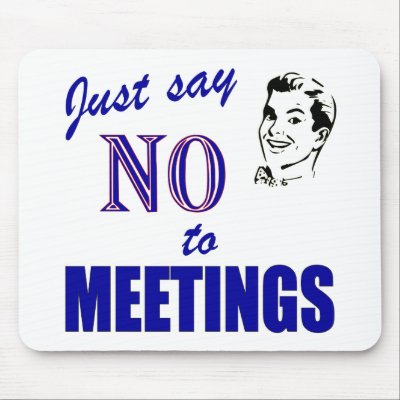
Successful projects and teams require meetings to accomplish important goals and objectives. Busy leaders, however, are typically anti-meeting because of the interruption they appear to be in the process of getting actual work done.
Much of this frustration, I have discovered, is in the lack of proper preparation prior to the meeting. When done well, time spent in meetings can make projects better and strengthen the work of the organization.
Take 7
Here are 7 ways to prepare for more effective meetings
Ask the big question
Personally, most meetings feel as if they are an interruption, even though I realize their importance. If the issue can be handled without meeting, most people will not dispute that decision. Unnecessary meetings cause frustration and slow progress. Gain agreement that a meeting is necessary, and each person will more likely come prepared and focused.
The big question to ask before scheduling a meeting is, “Do we need to meet?”
Determine a win
The meeting will be more successful if its purpose is clearly defined before the meeting begins. Ask the question, “What do we need to accomplish in the meeting for it to be successful?” Working toward a defined win will help keep the meeting headed in the right direction.
Invite the right people
Not every meeting needs to involve every person on the team. Decide who needs to be at the table, and invite the appropriate people. Those without a defined purpose will tend to drag the meeting away from its purpose, leaving everyone feeling frustrated.
As a leader, I usually ask people on my team, “Do I need to be there?” I suggest that both the meeting organizer and each person invited ask this question when it is not clear, before placing it on their calendar.
Decide on a time limit and frequency

I get very bored after an hour. Some of our meetings (such as our bi-weekly staff meetings) take longer. As a rule, though, I prefer
shorter and less frequent meetings. If you are attracting leaders to your organization, they will want to minimize time spent in meetings as much as possible.
Craft an agenda
The meeting should be focused on its intended purpose. Time must be well-managed, but not too rigidly controlled. Be sure to allow adequate time for brainstorming, questions, and the necessary social interaction that happens amidst healthy teams. For our team, informal social interaction begins the creative process and leads to people buying into the purpose of the meeting.
Give adequate notice
This is not always possible. When it is, however, those people who like to be prepared, have introverted tendencies, or are highly organized will participate much more actively, if they are given adequate time to prepare for the meeting.
Plan to start and end on time
People are less hesitant and more interested to attend meetings if they know their time is valued will not be abused.
Which of these ideas do you think could most improve your meetings? What tips do you have for preparing for more effective meetings?
——————–
Ron Edmondson is Co-Pastor at Grace Community Church
He specializes in Communication, Strategy, Org Behavior, Mgmt and Marketing
Email | LinkedIn | Twitter | Facebook | Blog | Web
Edited by Mike Weppler
Image Sources: rlv.zcache.com, cakes.dqd.com, rlv.zcache.com
Related articles
- 7 Ways to Correct Team Members Correctly (linked2leadership.com)
- 10 Ways to Put Your Meetings on a Diet (timemanagementninja.com)
- Running Effective Meetings – Communication Skills Training from MindTools.com (mindtools.com)


[…] 7 Steps to (Much) More Effective Meetings (linked2leadership.com) […]
[…] 7 Steps to (Much) More Effective Meetings (linked2leadership.com) […]
Reblogged this on Gr8fullsoul.
Reblogged this on Gr8fullsoul.